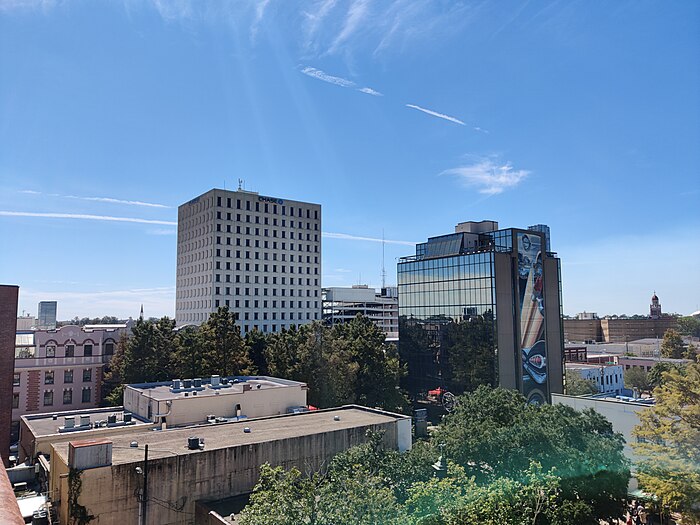Moving to Lafayette, Louisiana
About Lafayette, Louisiana

Lafayette ( LA(H)-F-ee-ET, French: [lafajɛt]) is the most populous city in and parish seat of Lafayette Parish in the U.S. state of Louisiana, located along the Vermilion River. It is Louisiana's fourth-most populous city with a 2020 census population of 121,374; the consolidated city-parish's population was 241,753 in 2020. The Lafayette metropolitan area was Louisiana's third largest metropolitan statistical area with a population of 478,384 at the 2020 census. The Acadiana region containing Lafayette is the largest population and economic corridor between Houston, Texas and New Orleans.
Originally established as Vermilionville in the 1820s and incorporated in 1836, Lafayette developed as an agricultural community until the introduction of retail and entertainment centers, and the discovery of oil in the area in the 1940s. Since the discovery of oil, the city and parish have had the highest number of workers in the oil and natural gas industry in Louisiana as of 2018. With the issuance of a bond ordinance for a series of roads connecting nearby settlements; the establishment of the University of Louisiana System's Lafayette campus; and the continued diversification of its economy, Lafayette and its metropolitan area have experienced population growth since the 1840 census and was promptly nicknamed "The Hub City." The city and parish of Lafayette are also known as the "Heart of Acadiana."
As a result of its growth, the city and region have become major centers for the technology industry; Lafayette also became a major center for health care and social services, aerospace, banking and retail. Notable corporations with headquarters or a large presence in the Lafayette area have included Amazon, Brookshire Grocery Company, CGI, JP Morgan Chase, Ochsner Health System, Petroleum Helicopters International, and Rouses Markets.
Lafayette is home to a diverse population from Louisiana Creole and Cajun backgrounds. In 2014, Lafayette was named the "Happiest City in America.” The city and region's cultural icons include Alexandre Mouton House, Brandt House, Charles H. Mouton House, the Cathedral of Saint John the Evangelist, Daigle House, First United Methodist Church, Holy Rosary Institute, Hope Lodge No. 145, and Old Lafayette City Hall. Its educational institutions include the University of Louisiana at Lafayette, South Louisiana Community College, and Remington College.
Gender
| Gender | Lafayette | Louisiana | Country |
|---|---|---|---|
| Female | 51.9% | 51.2% | 50.8% |
| Male | 48.1% | 48.8% | 49.2% |
Gender
Household Income
| Income | Lafayette | Louisiana | Country |
|---|---|---|---|
| Less than $10,000 | 9.3% | 8.9% | 5.8% |
| $10,000 to $14,999 | 4.9% | 5.5% | 4.1% |
| $15,000 to $24,999 | 10.2% | 12.2% | 8.5% |
| $25,000 to $34,999 | 9.5% | 10.2% | 8.6% |
| $35,000 to $49,999 | 12.5% | 12.5% | 12.0% |
| $50,000 to $74,999 | 17% | 16.3% | 17.2% |
| $75,000 to $99,999 | 11.7% | 11.4% | 12.8% |
| $100,000 to $149,999 | 12.7% | 13% | 15.6% |
| $150,000 to $199,999 | 5.2% | 5.3% | 7.1% |
| $200,000 or more | 6.9% | 4.7% | 8.3% |
Education
| Education | Lafayette | Louisiana | Country |
|---|---|---|---|
| < 9th Grade | 3% | 5% | 5.0% |
| 9-12th Grade | 7% | 9% | 7.0% |
| High School or GED | 25% | 33% | 27.0% |
| Other College | 21% | 21% | 20.0% |
| Associate's Degree | 5% | 7% | 9% |
| Bachelor's Degree | 26% | 16% | 20.0% |
| Master's Degree | 8% | 6% | 9.0% |
| Professional Degree | 3% | 2% | 2.0% |
| Doctorate Degree | 2% | 1% | 1.0% |
Household Income
Education
Race / Ethnicity
| Ethnicity | Lafayette | Louisiana | Country |
|---|---|---|---|
| White | 60.7% | 58.3% | 60.1% |
| African American | 30.4% | 31.9% | 12.2% |
| American Indian | 0.2% | 0.5% | 0.6% |
| Asian | 2.3% | 1.7% | 5.6% |
| Hawaiian | 0.1% | 0% | 0.2% |
| Other | 0.2% | 0.3% | 0.3% |
| Multiracial | 2.4% | 2% | 2.8% |
| Hispanic | 3.7% | 5.2% | 18.2% |
Race / Ethnicity
- ALABAMA
- ALASKA
- ARIZONA
- ARKANSAS
- CALIFORNIA
- COLORADO
- CONNECTICUT
- DELAWARE
- FLORIDA
- GEORGIA
- HAWAII
- IDAHO
- ILLINOIS
- INDIANA
- IOWA
- KANSAS
- KENTUCKY
- LOUISIANA
- MAINE
- MARYLAND
- MASSACHUSETTS
- MICHIGAN
- MINNESOTA
- MISSISSIPPI
- MISSOURI
- MONTANA
- NEBRASKA
- NEVADA
- NEW HAMPSHIRE
- NEW JERSEY
- NEW MEXICO
- NEW YORK
- NORTH CAROLINA
- NORTH DAKOTA
- OHIO
- OKLAHOMA
- OREGON
- PENNSYLVANIA
- RHODE ISLAND
- SOUTH CAROLINA
- SOUTH DAKOTA
- TENNESSEE
- TEXAS
- UTAH
- VERMONT
- VIRGINIA
- WASHINGTON
- WEST VIRGINIA
- WISCONSIN
- WYOMING
